Pride at 50: The LGBT revolution sparked in a basement
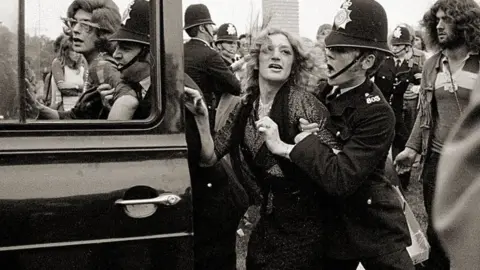 Alamy/Mirrorpix
Alamy/MirrorpixIt's 1972 - the swinging '60s are over, the miners' strike has turned off the lights and Donny Osmond is topping the charts with Puppy Love.
It will be another 20 years before same-sex attraction is declassified as a mental illness and, despite homosexual acts being decriminalised, in 1967, the age of consent remains five years older than for heterosexual couples.
But, in a basement room at the London School of Economics, a revolution is brewing.
Fresh from protests calling for the age of consent to be lowered, the year before, members of the Gay Liberation Front are planning a new march - not only demanding change and equality but celebrating who they are.
And, although they do not yet know it, the ripple effects will still be felt decades later.
The UK's first Pride protest is about to be born.
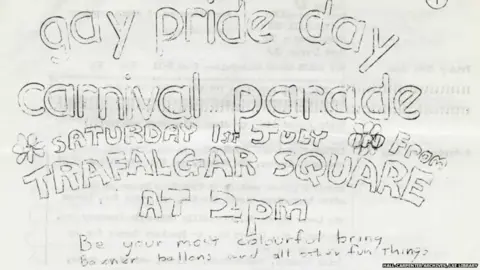 Hall-Carpenter Archives, LSE Library
Hall-Carpenter Archives, LSE LibraryBBC News has brought together some of those original members who attended the first UK Pride march, in 1972, and some LGBT people from the younger generation - to reflect on how much has changed and how much is still to be done.
'By the time we'd finished snogging each other, the police had completely disappeared' - Stuart's story
Stuart Feather was 32 when he attended his first GLF meeting, in the early 1970s.
"They were telling us about coming out and how important it was for us to stand up and be recognised and that we weren't the monsters the press, psychiatrists and everyone else was telling the world we were," he says.
"In a way, I had no self-worth.
"I had no gay pride or anything like that, because I had been hiding who I was."
But before long, Stuart was marching for gay rights and joining feminists protesting against Miss World contests.
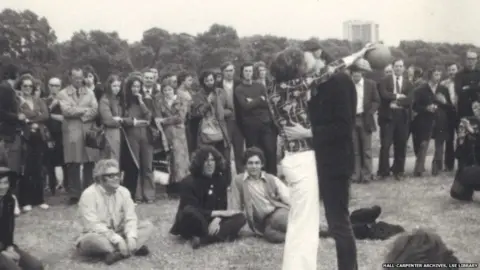 Hall-Carpenter Archives, LSE Library
Hall-Carpenter Archives, LSE LibraryOn 1 July, several hundred people came to London's Trafalgar Square for the first Pride march.
Many carried placards and wore fancy dress.
"There were so many police on either side of us that you couldn't really see us," Stuart says, "but when we got to Marble Arch, we had a mass kiss-in - and by the time we'd finished snogging each other, the police had completely disappeared.
"They were so disgusted with what we were doing and ultimately powerless."
'It was brilliant - the freedom, the ability to be yourself' - Bruce's story
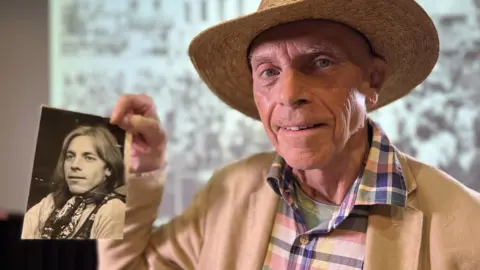
For Bruce Bayley, the concept of a gay-pride march was different from that of previous political marches.
"I thought of it more as a takeover of joy," he says.
"It said, 'Look, you can be joyful in something political that you're doing.'"
Bruce was 24 when he joined the GLF.
He had grown up in India but was studying sociology in London and had been awarded a grant to research political "deviants".
On the recommendation of his tutor, Bruce decided to study the GLF - and it changed his life.
"As soon as I began to research the GLF, and the more I went to their meetings and discos, I soon realised I was 'one of them'," he says.
"It was brilliant - the freedom, the ability to be yourself, the excitement, the glamour, the bravery and the courage to say, 'Yes, I am gay.'"
'There are still many challenges' - Rebecca's story
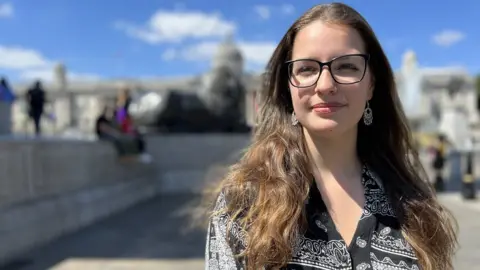 BBC News
BBC NewsRebecca Bullamore, 21, is organising a group of her friends to go to their very first London Pride parade together, on Saturday, 2 July.
"Of course we've come long way in 50 years," she says, "but many people around the world don't have the rights and so many in this country don't feel comfortable expressing themselves and really struggle coming out.
"There is more positive representation in media and positive stories and children's books with representation - that is really important - but there are still many challenges of people not caring or understanding and polarising the community."
'There was this tremendous personal feeling of liberation and love' - Angela's Story
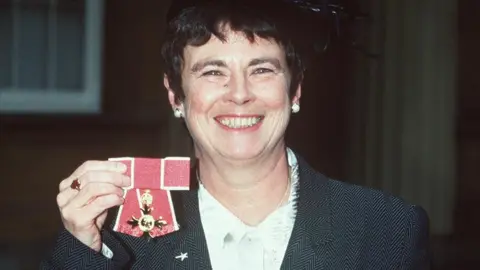 BBC News
BBC NewsAngela Mason joined the GLF when it was formed, in October 1970, and it enabled her to live openly for the first time.
"I had not been out before and had been having quite a miserable time and suddenly there was this tremendous personal feeling of liberation and love and solidarity," Angela says.
"It wasn't an individual experience - what made it so exciting was that it was a collective experience, the most exciting period of my life."
She met her partner, Elizabeth Wilson, at a GLF meeting - and the pair are still together.
Angela went on to become director of Stonewall and successfully led the campaign to lower the age of consent.
'There was a sense of naughtiness' - Shân's story
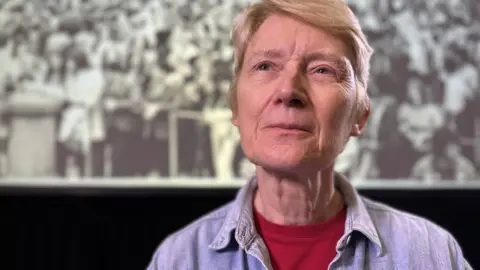 BBC JOSH PARRY
BBC JOSH PARRYWhen Shân Veillard-Thomas joined the GLF, she had just met her first girlfriend and run away from home.
She was part of a group of 30 that organised the first Pride protest.
"The march was very controversial - it was terrifying, it was daring, I was only 21," Shân says.
"There was a sense of naughtiness and daringness that was attractive to me.
"It was very public and we were being very daring coming out in the street, in public."
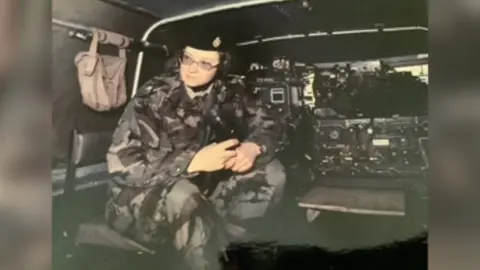 Shan veillard-thomas
Shan veillard-thomasBut that experience would be short lived because, a year later, Shân joined the Army and was driven straight back into the closet.
She had not realised it was illegal to be gay in the military at the time - and remained so until 2000.
"It wasn't talked about," Shân says.
"I saw a few reports which horrified me, of the level of interrogation that was going on.
"I hoped just never to meet another woman."
Shân went on to marry a man and had children in what she says was a very loving relationship.
But years later, she once again came out as a lesbian.
'It's about expressing who you are' - Sam's story
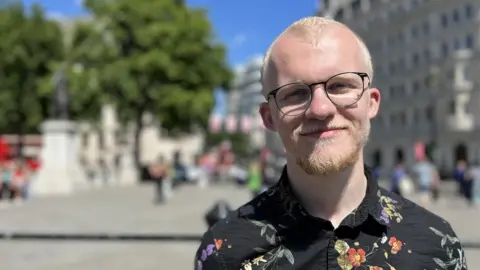 BBC News
BBC NewsSam Stevens, 23, says Pride should make leaders look at how they communicate with the rest of the world, including Saudi Arabia and China, which have anti-LGBT laws.
"Pride is a protest and that's true to a certain extent," he says, "but it's about expressing who you are and generally understanding each other.
"When I was a kid, the word 'gay' was used as an insult but now it's not so much and it's not accepted and that's good.
"We need to see more of that - and that's impacted by the laws."
'The gay manifesto' - Roz's story
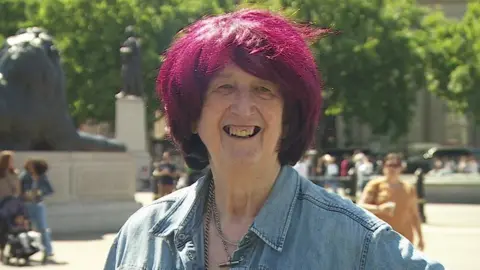 BBC NEWS
BBC NEWSIn the autumn of 1971, when she met the GLF, Roz Kaveney was 22 and had already come out as transgender, in what she described as a "frightening time".
She co-wrote the transgender section of the Gay Liberation Front Manifesto, a pamphlet calling for an end to "oppression", with a list of demands, including changes in the law and society's attitudes towards LGBT people.
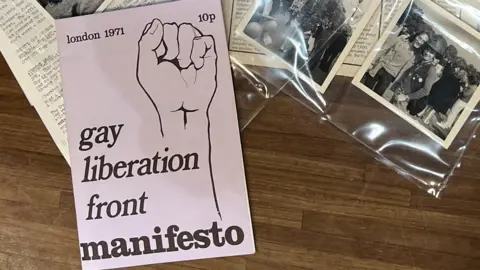 BBC news
BBC news"It was for everyone whether they are black, white, trans, cis - not that that language was available to us at the time - straight and gay, marching together into the 'glorious liberated future'," Roz says.
"It was probably rather more of an idealistic document than even I felt at the time - but it was a manifesto."
And parts of it remain valid today.
Like many of the GLF, Roz continued campaigning, marching against Section 28 of the Local Government Act 1988, which effectively banned homosexuality being taught in schools and was repealed in 2003, and for 2004's Gender Recognition Act, which enabled trans people to legally change the gender on their birth certificate.
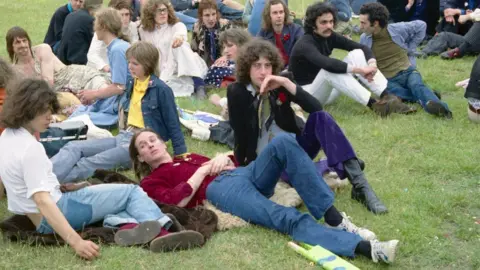 Jamie Gardiner
Jamie GardinerThe GLF will re-create that first Pride protest, on Friday, setting off from St Martin's in the Fields, near Trafalgar Square, at 13:00.
